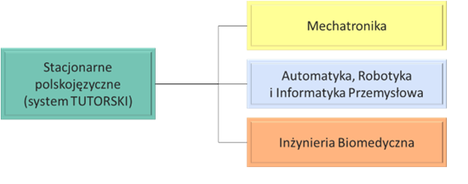Study courses
Mechatronics
Graduates of Mechatronics have advanced knowledge of mechanics, electronics, automation and computer science. Depending on the subject of their diploma thesis, they acquire skills in the field of advanced optical and photonic measurement methods, design and application of measuring instruments and systems related to industrial process automation. Solving complex interdisciplinary design and construction problems, designing, manufacturing and operating precision and electronic equipment, including multimedia equipment, and technological devices and processes, also in the field of electronic and precision microcircuit technology, and nanotechnology of moulding and nanomaterials. All competences are acquired through an individualised training path, selected according to the graduate's interests and conducted under the scientific supervision provided throughout the course of study. As a result, graduates are prepared to creatively participate in and lead teams preparing implementations of advanced mechatronic systems in research and development centres and industrial enterprises. They are able to work effectively as designers, organisers and managers in industry.
Automatics, Robotics and Industrial IT
Graduates of the Automatics, Robotics and Industrial Computer Science programme are competent in the design of devices and modern automation systems, the creation of complex IT solutions for industry as well as the automation and robotisation of manufacturing processes, including the design and control of robots and manipulators. Depending on the area of the diploma thesis, students acquire skills in modelling and simulating physical phenomena and technical devices using specialised software, as well as designing complex multidimensional control systems including issues of diagnostics and optimisation. They are prepared to design and implement large information systems and to develop specialised modules of such systems. These competences are acquired through an individualised learning path, selected according to the graduate's interests and conducted under the academic supervision provided throughout their studies. Thanks to this approach, they are prepared to creatively participate in and lead teams preparing the implementation of advanced IT systems and automation and robotics in research and development centres and industrial enterprises.
Biomedical Engineering, Specialty Medical Apparati
Biomedical Engineering graduates have advanced knowledge of electronic medical apparatus, computer science, medical information systems, medical telematics, machine learning, modelling of phenomena and processes, especially biological medical imaging techniques, signal analysis and biomedical imaging data, biomechanics, modelling of biological structures and physiological processes, radiology and radiotherapy. Graduates are skilled in formulating and solving biomedical engineering problems, design, technology development and construction. They are prepared to participate in interdisciplinary research and development work, and in particular to solve research problems and implement new solutions. They are qualified to work in the medical equipment industry, to cooperate with doctors, to work in the technical background of medicine, to act in small and medium-sized enterprises, consulting and advisory units and in state and local administration.






